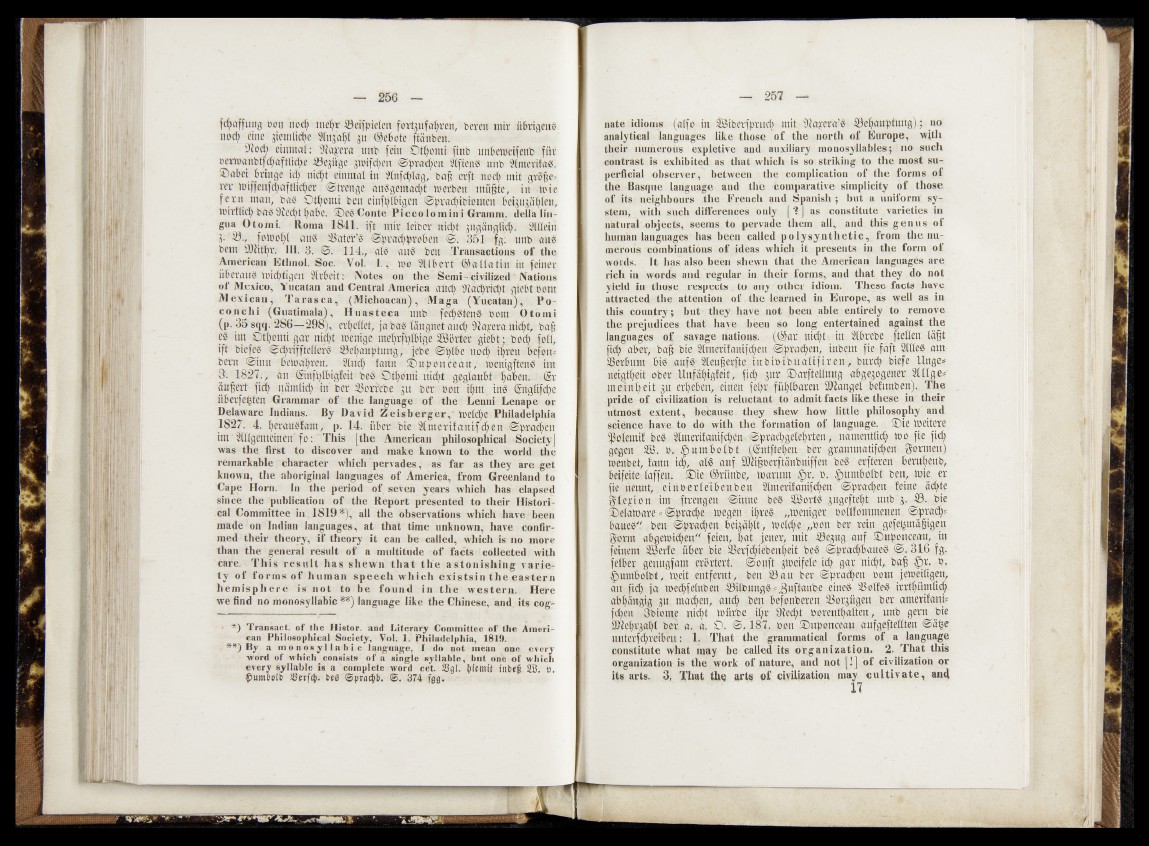
R affun g bon nod; mel;r ©eifpielcn fortgufo^ren, beren mir übrigens
noth eine siemüd>e % t'|a p 31t ©ebote ftänben.
9^bd; einmal: diajcera itnb feilt O ip u ti finb nnbemeifenb für
t)ertx*attbtfc^>af11icf)e Söejitge jtüifdfett @prad;en SlfienS unb ülmerifaS.
5Dabei bringe id; nid;t einmal in 2lnfd;lag, baß erft 11 od; mit größe*
rer tbiffenfd;aftlicher (Strenge anSgcmad;t tu erb eit müßte, in toie
fe rn man, baS Od;omi beit einftylbigen Sprad;ibiomen beigugä^Ien,
mirflid; baS9ied;tl;abe. ©eSConte Piccolomini Gramm, della lingua
Otomi. Roma 1841. ift mir leiber nid?t 3itgänglid;. Slllein
3. ©., fotnop aus ©at er’S ©pradjproben S . 351 fg. mtb aus
bem iDiitl;v. III. 3. S . 114., als and ben Transactions of the
American Ethnol. Soc. Vol. I., too 2 llb ert © a lla tin in feiner
Überaus toid;tigcn SIrbeit: Notes on the Semi-civilized Nations
of Mexico, Yucatan and Central America and; 9tad;rid;t giebt Oom
Mexican, Tarasca, (Michoacan), Maga (Yucatan), Po-
conchi (Guatimala), Huasteca ttnb fed;StenS bom Otomi
(p. 35 sqq. 286—298), ert;et(et, ja bad läugnet and; dia^'era nicht, baß
ed im Dtl;onti par nid^t toenige mel;rfl;lbige ©Sorter giebt; bod; foil,
ift biefeS ©d;rif|tellerS ©ef;auptimg, jebe ©t;lbe nod; ihren befott-
b e n t'S in n betoapen. 2(itd; fann © itb o n c e a u , toenigftend im
3 . 1827., an (Sinfpbigfeit bed iD tpm i nid;t geglaubt haben. @r
äußert fid; natttltd; in ber ©orrebe 31t ber bott ifttt ittd (Sttglifdje
überfeinen Grammar of the language of the Lenni Lenape or
Delaware Indians. By David Zeisberger,' toetd;e Philadelphia
1827. 4. p rau d fan t, p. 14. über bie © m crifan ifd ;en .©f>rad;en
im Allgemein eu fo : This [the American philosophical Society]
was the first to discover and make known to the world the
remarkable character which pervades, as far as they are get
known, the aboriginal languages of America, from Greenland to
Cape Horn. In the period of seven years which has elapsed
since the publication of the Report presented to their Historical
Committee in 1819 *), all the observations which have been
made on Indian languages, at that time unknown, have confirmed
their theory, if theory it can be called, which is no more
than the general result of a multitude of facts collected with
care. This result has shewn that the astonishing variety
of forms of human speech which existsin the eastern
hemisphere is not to be found in the western. Here
we find no monosyllabic **) language like the Chinese, and its cog-
*) Transact, of the Histor. and Literary Committee of the American
Philosophical Society, Vol. 1. Philadelphia, 1819.
**) By a m o n o s y l l a b i c language, I do not mean one every
word of which consists of a single syllable, but one of which
every syllable is a complete word cet. ißgl. fit tttbejj SB, »,
SJerfcji. bsd (Spracht. 3 7 4 fgg.
nate idioms (alfo in ©Hberfjmtd; mit 9taj:era’3 ©eljauptung); no
analytical languages like those of the north of Europe, with
their numerous expletive and auxiliary monosyllables; no such
contrast is exhibited as that which is so striking to the most superficial
observer, between the complication of the forms of
the Basque language and the comparative simplicity of those
of its neighbours the French and Spanish ; but a uniform system,
with such differences only [1 ] as constitute varieties in
natural objects, seems to pervade them all, and this genus of
human languages has been called polysynthetic, from the numerous
combinations of ideas which it presents in the form of
words. It has also been shewn that the American languages are
rich in words and regular in their forms, and that they do not
yield in those respects to any other idiom. These facts have
attracted the attention of the learned in Europe, as well as in
this country; but they have not been able entirely to remove
the prejudices that have been so long entertained against the
languages of savage nations, (© ar nid;t in ©brebe [teilen läßt
fid; aber, baß bie 2lnterifanijd;eu (Sprachen, inbeut [ie faft Stiles am
©erbum bis aufs ©eußerfte i n b ib ib u a lif ir e n , burd; biefe Unge*
neigtl;eit ober Unfäljtgfett, [id; -gp ©arftellung a6g630getter 2lllge=
m etn ljett 31t ergeben, einen [el;r fühlbaren ÜÖiangel befitnben). The
pride of civilization is reluctant to admit facts like these in their
utmost extent, because they shew how little philosophy and
science have to do with the formation of language. ©ie to eitere
ißolemif beb Ülmertfatufd;en @:pracl;gelet;rten, namentlich too [ie [ich
gegen SB. b. ^ n m b o t b t (@ntftei)eu ber grammatifd;en form en)
toenbet, lann ich, auf SJiißoerftänbniffen beS erfteren beruhenb,
beifeite taffen, ©ie ©ritnbe, toarurn fpr. b. ^um bolbt ben, toie er
[ie nennt, e tn b e rle ib e n b e n 2lmerifanifd;ett (Sprachen feine ächte
$ lejcion im ftrengen ©inne beS ©Sorts 3ugeftel;t unb 3. S3, bie
©elatoare * ©prache toegen i^reS „toeniger bollfommenen ©prad)'
baueS" ben ©prachen bei3ähtt, meld;e „bon ber rein gefetjinäßigen
gorrn abgetrieben" feien, hat jener, mit iöegug auf ©uponceau, in
feinem Sßöerfe über bie ©erfdjiebenheit beS ©pradjbaueS © . 316 fg.
felber genugfam erörtert, ©onft jmeifele id; gar nicht, baß £>r. b.
^um bolbt, toeit entfernt, ben © a n ber ©prachen bom jeweiligen,
an [ich ja voechfelnben ©ilbungS 3 3 uftanbe eines ©olfeS irrthümlid;
abhängig 3U madjen, auch ben befonberen ©or3Ügen ber amertfant*
fd;en 3biome nicht mürbe ihr 9?ed;t borenthatten, unb gern bie
9)?ehr3at;l ber a. a. D . ©. 187. bon ©ubonceau aufgeftellten ©ä^e
untcrfchreiben: 1. That the grammatical forms of a language
constitute what may be called its organization. 2. That this
organization is the work of nature, and not [!] of civilization or
its arts. 3, T h a t th e arts o f civilization may c u l t iv a te , and
17